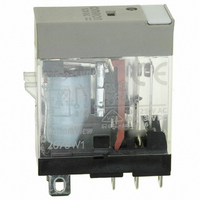G2R-1-SND-DC12(S) Omron, G2R-1-SND-DC12(S) Datasheet - Page 21

G2R-1-SND-DC12(S)
Manufacturer Part Number
G2R-1-SND-DC12(S)
Description
RELAY SPDT 12VDC PLUG-IN W/LED
Manufacturer
Omron
Series
G2RSr
Datasheets
1.G2R-1A-E-DC12.pdf
(30 pages)
2.G2R-1A-E-DC12.pdf
(14 pages)
3.G2R-1-S_DC12S.pdf
(12 pages)
Specifications of G2R-1-SND-DC12(S)
Relay Type
General Purpose
Contact Form
SPDT (1 Form C)
Contact Rating (current)
10A
Switching Voltage
440VAC, 125VDC - Max
Coil Type
Standard
Coil Current
43.2mA
Coil Voltage
12VDC
Turn On Voltage (max)
8.4 VDC
Turn Off Voltage (min)
1.8 VDC
Mounting Type
Socket
Termination Style
Quick Connect - .187" (4.7mm)
Circuit
SPDT (1 Form C)
Contact Rating @ Voltage
10A @ 250VAC
Control On Voltage (max)
8.4 VDC
Control Off Voltage (min)
1.8 VDC
Coil Voltage Vdc Nom
12V
Contact Current Max
10A
Contact Voltage Ac Nom
250V
Contact Voltage Dc Nom
30V
Coil Resistance
278ohm
Contact Configuration
SPDT
Lead Free Status / RoHS Status
Lead free / RoHS Compliant
Other names
G2R-1-SNDDC12(S)
G2R-1-SNDDC12(S)
G2R1SNDDC12S
Z2952
G2R-1-SNDDC12(S)
G2R1SNDDC12S
Z2952
Available stocks
Company
Part Number
Manufacturer
Quantity
Price
Company:
Part Number:
G2R-1-SND-DC12(S)
Manufacturer:
Omron Electronics Inc-IA Div
Quantity:
135
Process 4: Soldering Reflow
Note: Do not submerse the relay in a solder bath. Doing so will deform the resin, causing faulty operation.
Process 5: Cleaning
Boiling cleaning and immersion cleaning are recommended. When washing the product after soldering the relay to a PCB, use a water-based
solvent or alcohol-based solvent, and keep the solvent temperature to less than 40°C
Ultrasonic cleaning will have an adverse effect on the performance of relays not specifically manufactured for ultrasonic cleaning.
Chlorine-based
Water-based
Alcohol-based
Others
Cleaning method
The recommended soldering conditions show the temperature
changes of the PCB surface. The conditions, however, vary with
the relay model. Check the relay specifications before soldering.
(For details refer to the precautions for each model.)
Do not put the relay in a cleaning solvent or other cold liquid
immediately after soldering or the seal of the relay may be
damaged.
220 to 240
180 to 200
Recommended IRS Conditions (G6H-2F)
150
Solvent
List of Cleaning Solvents
Mounting with lead solder
Preheating
Perochlene
Chlorosolder
Trichloroethylene
Indusco
Holys
IPA
Ethanol
Thinner
Gasoline
90 to 120
Time (s)
Soldering
20 to 30
Yes
Yes
Yes
No
Automatic cleaning
Ultrasonic cleaning
(see note 4)
Air cooling
Fully Sealed
Electromechanical Relays
Note: 1. Consult your OMRON representative before using any other
The recommended soldering conditions show the temperature
changes of the relay terminal section. The conditions, however,
vary with the relay model. Check the relay specifications before
soldering.
(For details refer to the precautions for each model.)
Do not put the relay in a cleaning solvent or other cold liquid
immediately after soldering or the seal of the relay may be
damaged.
2. Worldwide efforts are being made at discontinuing the use
3. It may be difficult to clean the space between the relay and
4. Ultrasonic cleaning may have an adverse effect on the per-
5. Contact Omron representative for recommended cleaning
Recommended IRS Conditions (G6H-2F)
cleaning solvent. Do not use Freon-TMC-based, thinner-
based, or gasoline-based cleaning solvents.
of CFC-113-based (fluorochlorocarbon-based) and trichlo-
roethylene-based cleaning solvents. The user is requested
to refrain from using these cleaning solvents
PCB using hydrogen-based or alcohol–based cleaning sol-
vent. It is recommended the stand-off-type be used, such as
G6A-@-ST, when using hydrogen-based or alcohol-based
cleaning solvents.
formance of relays not specifically manufactured for ultra-
sonic cleaning. Please refer to the model number to
determine if your relay is intended to be cleaned ultrasoni-
cally.
procedures of specific relays.
250 max.
Technical Information
230
180
150
Mounting with lead-free solder
Top surface of case (peak): 255˚C max.
Preheating
120 max.
Time (s)
Soldering
30 max.
Relay terminal
section
21


















